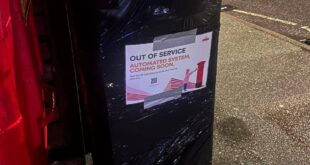Andy Brooks, New Communist Party of Britain addresses 20th international meeting of communist and workers’ parties in Athens, Greece.
Fight Back! interviewed Andy Brooks, General Secretary of the New Communist Party of Britain, on the impact of the pandemic in Britain.
Fight Back!: How are the working people of Britain being impacted by the pandemic?
Brooks: Well the pandemic is something no one in living memory has ever experienced. Thousands of workers, including many pensioners, have died due to the coronavirus. The emergency measures that were eventually taken in late March have now reduced the mortality rate. But many of those deaths could have been avoided if the Johnson government had taken emergency action when COVID-19 first spread to Britain at the beginning of the year.
Most schools and all “non-essential” shops have been closed for over two months, along with all sporting and social events under a lockdown regime not seen since the Second World War.
The government’s emergency measures to stave off social unrest were taken in consultation with the unions as well as Labour and the other opposition parties in Parliament. These included the suspension of business rates for small firms, extending sick pay and increased NHS [National Health Service] funding and providing subsidies for furloughed workers and the self-employed. But they only went part of the way to tackling the escalating threat of a devastating epidemic that has stretched the health service to its limits and seriously undermined the economy at the same time.
Workers have responded cautiously to the easing of some of the restrictions in June. Boris Johnson’s decision to shelve the plan to get primary school pupils back into the classroom before the summer break was welcomed by parents and teachers fearful of a premature return that could trigger off a second wave of the coronavirus plague, particularly given the government’s failure to get an adequate track and test system running and still no sign of a COVID-19 vaccine in sight.
Fight Back!: Are the big factories and large workplaces still functioning? If so, how are workers resisting?
Brooks: Manufacturers were exempted from the UK coronavirus clampdown on “non-essential” work, travel and gatherings. Staff were encouraged to work from home in large parts of the financial sector but in other areas the imposition of social distancing has led to massive cuts in their services.
The social restrictions, which banned all meetings of more than two people, has paralyzed the unions at the grassroots level. Many national union elections have been deferred for a year and all union conferences have been postponed until September at the earliest. The union bureaucracies, of course, continue to function and at a national level; they continue to negotiate with employers while lobbying the Labour Party leadership and the government in the usual way. But the rank and file have not been completely side-lined. While health service workers’ demands for personal protective equipment have still to be adequately met, transport and postal workers have had more success by threatening or taking wildcat action to enforce health and safety demands.
The actions of some Royal Mail depot managers, [which were] indifferent to the government’s emergency health and safety regulations, led to worker walkouts in a number of sorting offices in April that forced management to deep clean the sites and enforce the two metre spacing guidelines.
In London at least 33 London bus drivers have died from COVID-19 and a further ten underground and railway staff have also fallen to the deadly infection. In the absence of any serious response from management, many drivers began taping off the front of their buses to avoid close contact with passengers. This forced Transport for London to suspend all bus fares on April 20 when passengers were banned from using the front door in a bid to shield drivers because the emergency measure meant the card reader next to the driver’s cab was out of bounds.
Now we’re seeing workers, particularly young workers, taking to the street in support of the new Black Lives Matter campaign that erupted over the police killing of George Floyd in Minneapolis. When they pulled down the statue of the Bristol slave dealer Edward Colston and dumped it in the river last week they sent a message to the ruling class that goes far beyond the issue of the trans-Atlantic slave trade which built the British Empire in the first place.
Fight Back!: How does your organization view the government’s response to the pandemic?
Brooks: The Tory government’s response has been evasive and ambiguous. It’s led by Boris Johnson, a vain man clearly unfit to hold public office even by the low standards of the Tory Party he leads. Initially Boris Johnson’s plan for dealing with the coronavirus plague was to let the infection sweep through the population to keep people working to protect the capitalist economy, while accepting that tens of thousands of vulnerable elderly people would die prematurely as a consequence. But Johnson was forced to abandon the “herd immunity” ideas of his Rasputin, Dominic Cummings, which would have led to the deaths of hundreds of thousands of vulnerable pensioners, through public pressure that included doctors and pensioners’ groups.
Government figures say that some 41,000 people have died, so far, from coronavirus. Others say the real death toll, when all the deaths in care homes are factored in, is much, much higher. What is certain is that Britain has the highest death rate in the whole of Europe. The easing of the lockdown has led to a surge in the numbers returning to work in central London. Trains and buses are, once again, packed in the rush hours, firing fears that a new round of infection will spread like wildfire across the capital.
Fight Back!: What is the New Communist Party doing in response to this crisis?
Brooks: Our regular fund-raising events have been cancelled. We cannot hold public meetings. Our bookshop outlets are closed and our street sales have been suspended. This has produced a cash-flow problem, but our supporters have responded to the call and our weekly paper continues to come out, as it always has since 1977, for regular subscribers who receive it in the post.
As soon as we can, we will return to campaigning on the street. In the meantime, we fight to put the communist answer to the capitalist crisis back on the working-class agenda in the columns of our paper and in the social media. We stand for Marxism-Leninism. We fight for peace and socialism, solidarity with Venezuela and national liberation movements all around the world and the people’s democracies of China, Cuba, Democratic Korea, Laos and Vietnam. We’ve got plenty to say and everything we’ve said in the past has been proved right.
Our paper represents the voice of struggle in all its forms. It gives a clear communist line on the issues of the day, a Marxist-Leninist analysis of the problems facing the working class and it provides a window to the world communist movement and the national liberation movement; the bigger the readership, the greater our influence. This is our paramount task.



